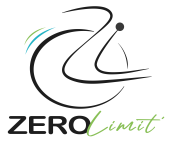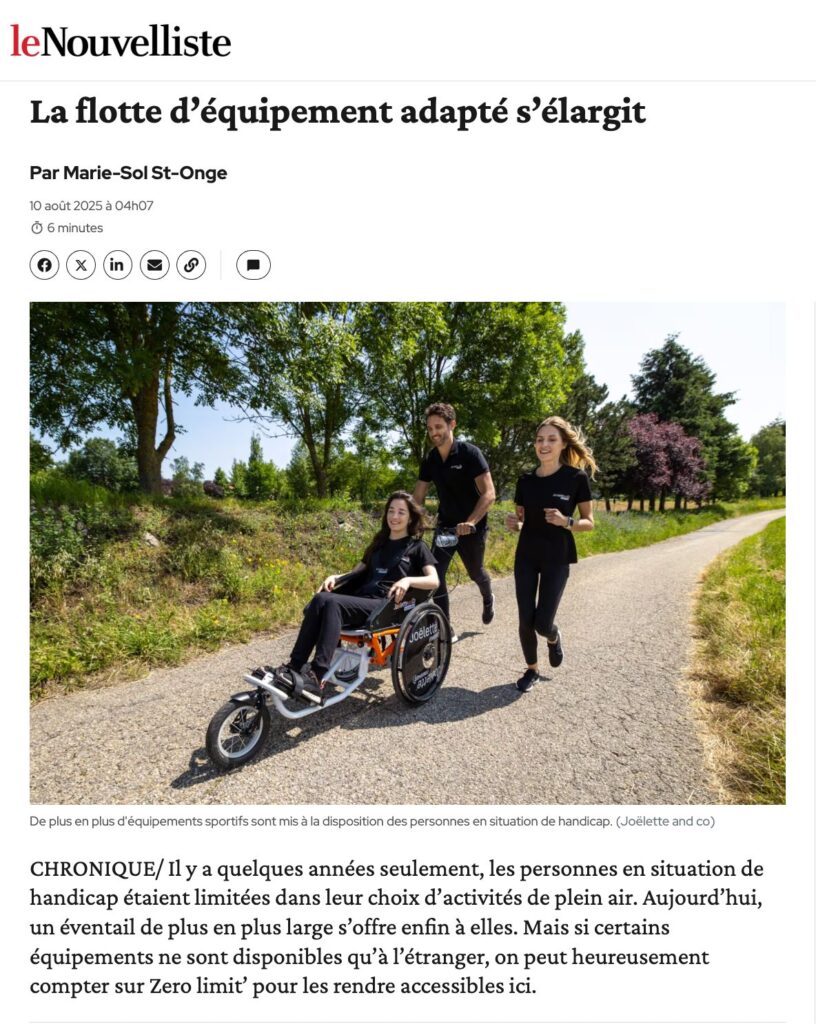Marie-Sol St-Onge, who has many strings to her bow—painter, TV presenter on Ami-télé, lecturer, author/journalist…— did us the honor of presenting Zero Limit’ and its products, with a special focus on the Joëlette Finisher in Le Nouvelliste.
The original article is in French on the following page (creating a free account is necessary to read the full article) but you will find a translated transcription below.
Find and/or discover Marie-Sol on her website, on Facebook or on LinkedIn.
The fleet of adaptive equipment is expanding
By Marie-Sol St-Onge in Le Nouvelliste
August 10, 2025
More and more sports equipment is being made available to people with disabilities
COLUMN/ Just a few years ago, people with disabilities were limited in their choice of outdoor activities. Today, they finally have an increasingly wide range of options. But while some equipment is only available abroad, fortunately we can count on Zero Limit’ to make it accessible here
“Right now, we’re in a period of development, and it’s really exciting,” says Gilles Roure enthusiastically. He has been running his company specialized in sports, leisure, and outdoor equipment for people with disabilities for about three years.
This wonderful adventure began in France, more specifically near Saint-Étienne, where the manufacturer Joëlette and Co is based. Originally invented in Savoie by a mountain guide, the first Joëlette was rather rudimentary. The man, who wanted to take his disabled nephew to the Alps, had installed a chair on a structure resting on a single wheel, designed to be supported by two companions. One at the front and one at the rear.
The guide, who did not want to commercialize his invention, passed it on to Ferriol-Matrat. This company, which has been in business for over 150 years, specializes in metal tubing.
They developed the Joëlette as we know it today, with handlebars controlling the disk brake, a suspension, two positions (“rest” and “in motion”), and compact storage.
Gilles Roure is from the same area as the manufacturer of Joëlettes, and when he was planning on moving to Quebec, he was offered the opportunity to represent the company on the other side of the ocean. But what was supposed to be a second occupation for someone who has always been sensitive to inclusion and equality turned out to be much more rewarding on a human level than any of his other experiences in sales.
“I no longer wanted to work in sales because I didn’t like having to sell just anything, to sell a product I had no connection to. But when I saw what it meant to people, the pleasure they got from doing an activity they were no longer able to do or had never been able to do, I thought it was fabulous,” he tells me.
The buoyant market and the happiness that the adaptive equipment brought to those around him quickly convinced him to give up his other job and devote all his time to promoting the different versions of the Joëlette.
There is one for children, one with an electric motor to assist carriers, and a model designed for road and trail strolling.
Although it has been on the market for just over two years, I was not familiar with the Joëlette Finisher. Originally, the equipment was designed for running. Only one pusher is required, and the braking system makes it very effective in competition. Since the Kartus, a hiking chair manufactured in Quebec, is well established in the world of shared-mode racing, the Finisher is a little more discreet on our trails. However, like the Kartus, the Finisher can also be used on trails with the all-terrain wheel option.
The few differences between the two models from different companies may offer advantages for some users and better suit their needs. Higher than the Kartus, the Joëlette Finisher’s seat is at the same level as a wheelchair, making transfers easier. The passenger’s position is not reclined but rather upright.
“Another very interesting and important feature, besides performance and comfort, is how easy it is to transport. You can fold it up and store it very easily in a car,” adds Gilles Roure, as a good representative.
The Sofao for swimming completes Joëlette and Co’s range, and Gilles thought that there were probably other pieces of equipment that were not available in Canada and that would be just as interesting for doing more activities. That’s how he discovered the Hippolib, which allows users to horseback ride, the Ice Perf for moving on ice, and several other adaptations that can be found on the Zero Limit’ website.
“The range expanded, I started working with other brands, and I could no longer present myself as a Joëlette and Co representative. So I created Zero Limit’”, explains Gilles Roure, who hopes to have contributed to expanding the options available to people with disabilities. “But I think it was also the right moment, the timing was perfect!”
It is through the relationships he builds with his customers that he begins his search abroad for the desired product. Gilles, who strives to offer a variety of activities, is delighted to see so much creativity, which sometimes emerges here and sometimes comes from elsewhere. Zero Limit’s range is expanding, multiplying the possibilities with, among other things, the VertaCat for golf and, most recently, the Stabipaddle for safe paddleboarding.
Aware of the financial realities faced by people with disabilities and the challenges of storing equipment, Gilles can sell directly to individuals, but he mainly targets public places.
“Someone who wants to engage in an activity isn not going to buy equipment that can cost thousands of dollars just to use it twice a year!”
He therefore works with cities, particularly to equip municipal swimming pools, arenas, and parks, especially since municipalities often have access to grants and more storage space.
“The goal is to offer opportunities wherever there is a need,” summarizes the founder of Zero Limit, before adding one final point to conclude our interview.
“Like many others, I also try to communicate that disability is not limited to people in wheelchairs. When we get older and lose mobility, we accept the idea of not doing certain activities because we are no longer able to do them, when in reality, with the same equipment as for people with disabilities, we can do some of them, sometimes with the help of someone.”
Zero Limit does not have a physical store. A website allows Gilles Roure to work remotely. He regularly presents his products at trade shows, activities, and events where he is invited.
By the way Gilles has confirmed his attendance at the next spring’s edition of La marche qui roule… stay tuned!

